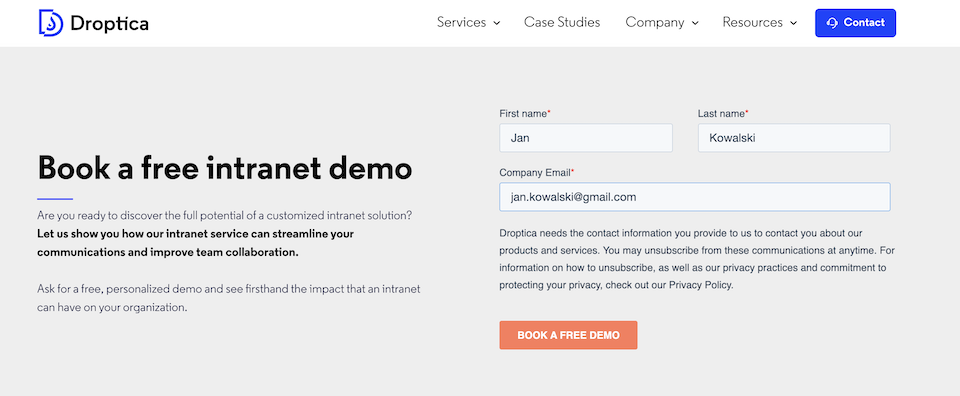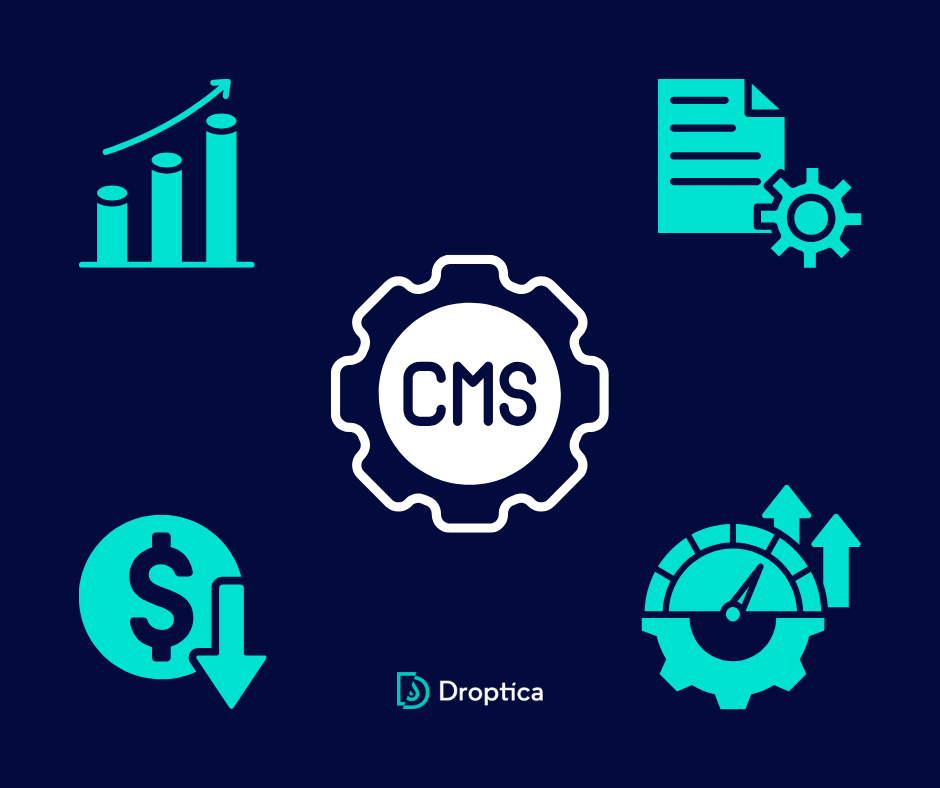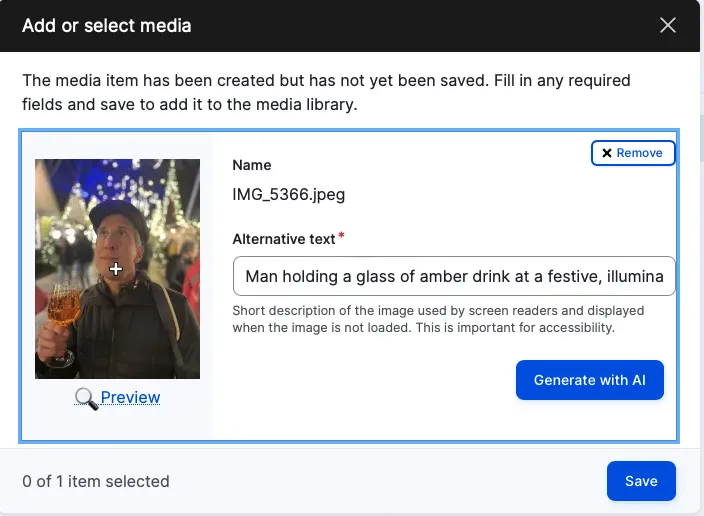
CMS in Marketing and Sales - Acquire Leads and Monitor Effectiveness
Effective lead generation and tracking is the foundation of any marketing and sales strategy. Without the right tool, companies often miss valuable opportunities to convert and build customer relationships. Choosing the right CMS for marketing and sales can be the key to increasing the effectiveness of your efforts and achieving your goals. Read our article to learn what to look for.
What is CMS in marketing and sales?
A content management system (CMS) is a platform that allows you to easily create, edit, and publish content on your web page. CMS in marketing and sales is an essential tool for supporting new customer acquisition, increasing online visibility, and building lasting relationships with audiences.
With an adequately chosen CMS platform, marketers and sales teams can achieve the above goals and significantly improve their operations - from designing attractive subpages to automating, for example, advertising campaigns and advanced performance reporting.
Why do companies need a CMS for marketing?
Companies that want to scale their marketing efforts need a CMS that goes beyond basic content creation and management. Advanced platforms allow marketers to operate faster, more efficiently and more flexibly.
Ability to quickly make changes to content and campaigns
Marketers often need to make changes quickly - whether in the blog post or the page structure promoting a new offer. A CMS for marketing makes it possible to make modifications ad hoc without involving the IT department with every task, even small ones.
Easy connection with other marketing tools
A modern CMS should be the center of the marketing ecosystem. It can seamlessly integrate with email marketing platforms and lead scoring, campaign automation, and analytics tools, allowing multiple team members to manage data and processes efficiently.
Access to real-time data and analysis
Analyzing campaign performance is the foundation of effective promotion. A CMS for marketing and sales should give access to clear reports and real-time statistics. This allows teams to evaluate campaign effectiveness and efficiently optimize strategy.
Key CMS capabilities to support marketing and sales
A well-designed CMS can significantly improve the entire marketing and sales process - from the moment a potential customer is interested in an offer to the final conversion. Here are three areas in which the CMS plays a significant role.
Lead generation - how CMS supports the acquisition of potential customers
Generating leads is one of the most critical goals in a marketing and sales strategy. CMS can greatly facilitate this process with several built-in functions that support acquiring valuable prospect data.
Creating effective contact forms
A well-designed form is a cornerstone in the lead generation process. Modern CMS systems allow the intuitive building of forms and their integration with dedicated landing pages or contact us pages. This allows marketers to quickly implement different versions and test their effectiveness.

An example of a simple contact form from the Droptica website
Conversion-oriented landing pages
CMS supports marketers in quickly creating landing pages, which play a key role in generating leads. Many platforms offer pre-built templates and visual editors, allowing pages to be built and optimized for conversion, such as through A/B testing, intuitive content layouts, or engaging call-to-action buttons.
Content personalization for better sales results
Personalizing content allows you to tailor messages to specific audiences, making your marketing and sales efforts more effective.
Dynamic content and recommendations
The CMS can display dynamic content to users based on their previous interactions with the website. This can include personalized headlines, product recommendations, or customized CTAs that increase engagement and conversion.
User segmentation
Advanced CMSs allow users to be segmented based on various criteria, such as location, browsing history, or engagement. This makes it possible to tailor communications to specific audiences and present them with the most relevant content.
A modern CMS is not just a tool for publishing content - it’s also a key element supporting marketing and sales strategies. However, to take full advantage of its potential, it’s worth integrating it with other marketing and analytical tools.
How does the CMS integrate with marketing tools?
The effectiveness of marketing and sales activities depends not only on the quality of content or intuitive user interface but also on how smoothly the system integrates with other tools and platforms. A well-designed CMS should enable a seamless exchange of data and information with external tools. This way, teams don’t have to manually transfer data between different systems, and those on user behavior or campaign results are always up-to-date and available in one place.
Integrations with CRM platforms and automation tools
One of the most critical aspects in developing customer relationships is the ability to quickly and seamlessly transfer information about leads to a CRM system (e.g., Salesforce, HubSpot, Pipedrive). A CMS that offers ready-made plug-ins or integration modules allows many practical steps.
- Automatic transfer of leads to CRM
After completing a contact form, user data can automatically go to CRM systems (e.g., Salesforce, HubSpot, Pipedrive). This immediately provides the sales team with complete information about the potential customer and allows them to take action faster. - Automatic segmentation and scoring of leads
CMS integration with CRM systems allows you to analyze user behavior and automatically assign scoring to them, making it easier for the sales team to identify the most valuable leads. - Personalizing marketing campaigns
CMS, combined with marketing automation tools, can initiate email sequences, display dynamic content on the website, or activate remarketing campaigns based on user activity.
Monitoring data with analytical tools
Reliable data analysis is the foundation for continuous improvement of marketing and sales strategy. The CMS should offer the ability to easily integrate with popular analytics platforms, such as Google Analytics, Matomo, or HubSpot Analytics. In practice, this means:
- User behavior tracking
With embedded tracking codes, marketers can gather information about how users navigate the site, which content generates the most interest, and what actions lead to conversions. - Analyze conversions and user paths
Integrating a marketing CMS with analytics tools makes it possible to assess the effectiveness of marketing efforts - where leads are coming from, which content is converting best, and which channels are generating the most traffic. - Access to up-to-date marketing data in one place
By synchronizing the CMS with CRM and web analytics tools, marketers can track key metrics in one panel, optimize campaigns, and make decisions based on accurate data instead of relying on intuition.
Effective CMS integration with external systems supports the entire marketing and sales process. Automatic exchange of information with the CRM allows for quick response to user actions, and access to detailed analysis helps optimize campaigns in real time. As a result, marketers and sales teams can reach the right audiences more effectively and manage customer relationships more efficiently along each contact path.
Advantages of using a CMS for marketing and sales
By choosing a CMS platform optimized for marketing and sales activities, companies gain a tool that streamlines teams' work and improves business results. Below are the key benefits of implementing such a solution.

Scalability and alignment with business goals
With dynamic market changes and growing customer needs, a CMS should grow with your business. Dedicated marketing solutions make it possible:
- Flexible expansion of functionality
As your business grows, you can add new modules, plugins, or integrations (e.g., with digital marketing tools or chatbots). At the same time, you don't have to abandon existing solutions, which gives you business continuity and minimizes costs. - Personalized content structure and layout
Extensive configuration options allow you to customize the CMS platform to fit the specifics of your industry. As a result, the web page can handle a comprehensive knowledge base, custom forms, or unique sales trails. - Better long-term performance
Dedicated systems for marketing and sales are often characterized by higher stability and performance with increasing traffic load and number of published content. A properly configured CMS can effectively handle thousands of simultaneous visitors without downtime or drops in speed.
Making it easier to manage content and campaigns
The marketing and sales team is often responsible for multiple projects simultaneously, from publishing blogs or e-books to email campaigns to running social media profiles. In such conditions, efficient content creation, management, and workflow are crucial. A good CMS for marketing offers:
- Intuitive editing interface
Marketers can easily schedule and publish content, create landing pages, and update digital content. You can often do it with drag-and-drop components, with no programming languages required. - Simple collaboration tools
The system can offer workflow tools that make it easy to manage creating and reviewing website content. It’s possible to assign tasks, set deadlines or share projects between different departments. - Conduct promotional campaigns with ease
A well-chosen CMS also streamlines the organization of marketing campaigns. Thanks to custom templates of pages or integrations with mailing tools, you can quickly prepare and launch a new promotional campaign while testing different variants of offers or messages.
Reducing costs and increasing operation efficiency
Last but not least, there are savings - both in time and money. CMS for marketing and sales activities helps in:
- Automate repetitive tasks
Whether it's sending a sequence of emails or updating digital content on several pages at once, automating processes translates into time savings and reduced risk of human error. - Efficient management of resources
The CMS, which works with analytical systems, provides the necessary data to measure the effectiveness of campaigns. This allows you to consciously allocate the budget to those activities that realistically produce the best results (such as the highest conversion rate or average transaction value). - Minimize development and maintenance costs
Instead of relying on numerous different tools or services, each of which generates additional fees, companies use one consistent platform. This simplifies administration and, in the long run, positively impacts the overall cost of doing business online.
With all these advantages, implementing a marketing and sales-oriented CMS gives companies real benefits through better business results, greater flexibility, and higher customer satisfaction. In the next section, we'll discuss specific examples of popular CMS platforms and take a closer look at why Drupal is an especially popular choice for organizations focusing on marketing and sales development.
CMS marketing examples - what should you pay attention to?
When choosing a CMS for your marketing needs, it's a good idea to look at the solutions available on the market and consider which features will be crucial for your business. Below is a brief comparison of popular platforms (including examples of the advantages and challenges of selected systems).
Comparison of popular platforms features
Each system has unique features and limitations, so it's a good idea to consider the current size of your project, your development plans, and your team's specific needs.
Drupal CMS
- Advantages:
- Perfect for non-technical users - the intuitive interface focuses on user-friendliness.
- This CMS supports integrations with analytical tools, CRM, and automation platforms.
- Built-in recipes enable quick implementation of key functions such as SEO (for search engines), analytics, media management, and data protection.
- Challenges:
- Advanced configuration for more complex projects - some custom implementations may require the support of an experienced team.
- Taking full advantage of the system's capabilities may require initial training or familiarization with available features.
WordPress
- Advantages:
- Easy to use, especially for beginners.
- An extensive ecosystem of plugins and themes to customize the website for different needs.
- Extensive community and lots of training materials.
- Challenges:
- It often requires multiple plugins to get advanced marketing features (e.g., automation, lead scoring).
- There is a potential risk of plugin conflicts or security issues if you don't ensure frequent updates and proper security practices.
HubSpot CMS
- Advantages:
- Strong focus on marketing and sales (integrated tools for automation, CRM, and analytics).
- It provides clear reports and is simple to create campaigns, landing pages, and forms.
- Built-in digital content personalization and lead nurturing features.
- Challenges:
- License costs can be high - especially for smaller companies.
- There is less flexibility for advanced customization compared to fully open-source systems.
Joomla
- Advantages:
- A good balance between ease of use and expandability.
- A lot of ready-made extensions to facilitate marketing activities (e.g., integrations with mailings).
- Joomla natively supports multilingual sites without installing additional plugins.
- Challenges:
- It has a smaller community and fewer plugins than WordPress.
- Often, additional programming work is required if you need specific marketing solutions.
Why does Drupal CMS work well as a marketing CMS?
Drupal CMS is a modern and versatile tool that combines intuitive use with advanced features. It gives marketers full control over content creation and campaigns, making it an excellent choice for both small and large marketing teams.
Intuitive operation and accessibility for non-technical users
This open-source CMS is designed to be primarily friendly to non-technical people, such as marketers and content editors. With drag-and-drop components, an intuitive interface, and visual tools such as Experience Builder, creating and editing pages can be done without any coding knowledge.
Ready functionality through recipes
Drupal recipes are sets of pre-configured modules and settings that allow quick deployment of key functionalities related to, for example, SEO (search engine optimization), analytics, or media management. This will enable marketers to get advanced functionality up and running in minutes, which would typically require days of developer work.
Flexible media management
Drupal CMS offers intuitive media management tools, such as setting the focal point of an image (focal point), predefined display styles, or the ability to override alternative texts. This allows you to quickly customize media for your campaigns and publications.
Accessibility and UX improvement
Real-time accessibility checking tools utilize assistive technologies to create content that meets users' needs. Improving accessibility not only supports people with disabilities but also positively impacts SEO (search engine optimization) and experience for all users.
Artificial intelligence (AI) support
Drupal CMS integrates with artificial intelligence to automate many processes. With the help of AI, marketers can, among other things, generate alternative text for images (alt text), create, translate, and edit content, and learn how to use the system in real time through interactive guidance. This innovative solution significantly speeds up work and simplifies daily operations.

Source: Drupal.org
CMS marketing and sales - summary
Choosing the right CMS for marketing and sales departments can significantly impact a company's business performance. A solution that enables efficient content publishing and editing, integration with analytical and CRM tools, communication automation, and advanced personalization becomes a key pillar of an effective digital marketing strategy. This makes it possible to effectively acquire new leads, better understand user behavior and optimize campaigns in real time.
Drupal, an open-source CMS, stands out from other platforms because of its flexibility, high-security standards, and comprehensive integration capabilities. This makes more and more companies - from startups to large enterprises - bet on this system, wanting to create an extensive marketing and sales ecosystem.
If you want to build a new content management platform or expand your current one to fully support marketing and sales, check out Droptica's custom CMS solutions. Our team of experienced professionals will help you select the right functionalities and integrations to support your team in their daily work.











